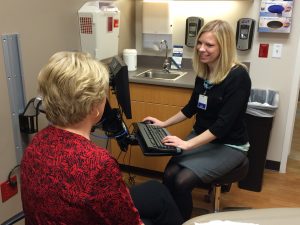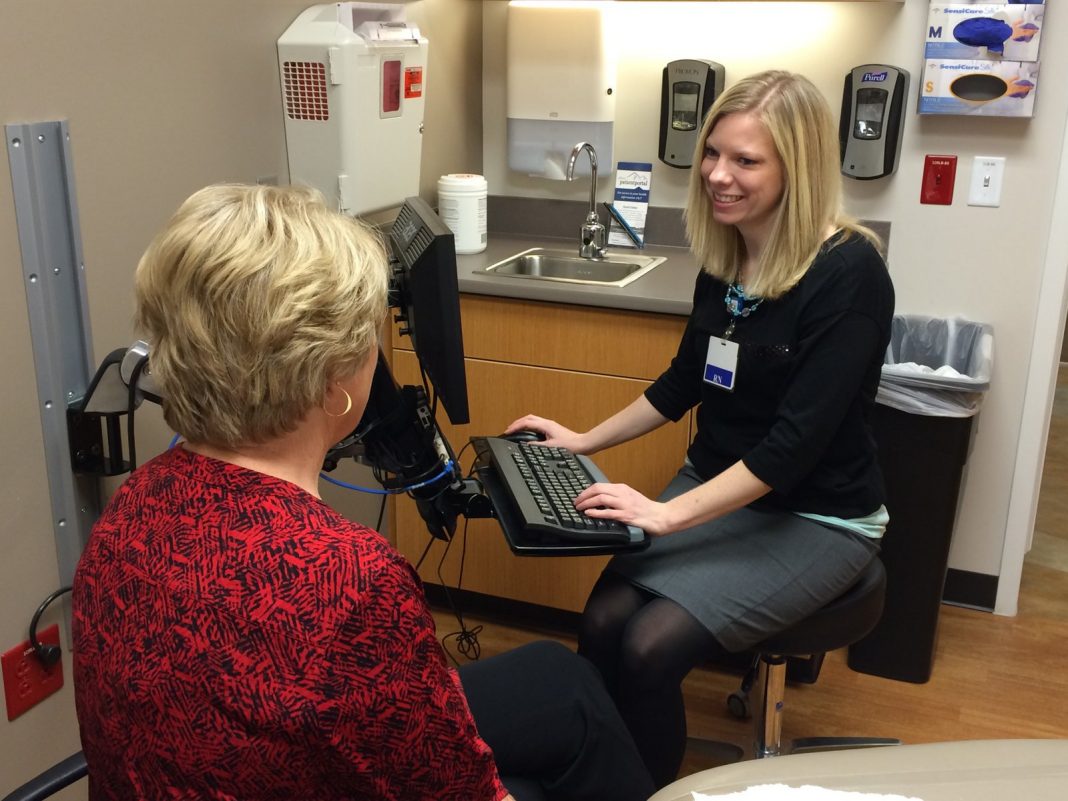Ashley Smith, BSN has a vision of how healthcare could look twenty years from now. “My goal would be for health and wellness to be completely integrated into every person rather than us going around and telling people why it’s important to be healthy,” she says. “Health would be ingrained in everyone, including kids.”
Smith is Summit Pacific Medical Center’s Care Transformation Manager, part of a comprehensive program that is helping to make her vision more of a reality in Grays Harbor County. The “Care Transformation” initiative switches the focus from “sick care,” or dealing with patients after the fact, to preventative medicine.

Care Transformation is a leadership driven initiative to look at how to decrease costs and improve the quality of care in the community. This is part of an overarching national agenda to move away from fee-for-service to value-based care Medicare in particular is a big advocate of Care Coordination. However, Molina and Amerigroup both recognized the value of this service and have worked directly with Summit Pacific to provide their patients the opportunity to benefit from Care Coordination as well.
“When Medicare initiated these types of programs, the question was, who’s going to try it out?” says Smith. “We think that’s the future of healthcare and we want to be ahead of the game. We’re that type of hospital.”
One of the goals is to demonstrate how effective preventative care can be. “If we can prove that we take better care of patients by making sure they get in for preventative health check-ups like wellness visits and mammograms, we can better target specific populations with several different programs,” says Smith.
The initiative has required new staff and new roles, specifically RN’s who have special training in health coaching. Care Coordinators target patients at highest risk for emergency room visits or developing chronic illnesses and function as personal health coaches. “We work with people on a one-on-one basis on staying out of the hospital,” says Smith. “They set goals and we help them achieve those goals.”
Topics include diet, medications, and exercise. “We do everything from helping patients lose weight and lower blood sugar levels to getting them transportation so they can get to their appointments,” she says. “Grays Harbor County doesn’t have a diabetic educator and our resources are very limited. Having an RN with this kind of training is pretty awesome.”
Often times the position of Care Coordinator requires helping patients navigate their way through the healthcare system, including different specialty providers, insurance coverage for services needed and transportation to and from important appointments.
One man Smith helped had an injury to his shoulder several years ago. He did not have many resources and had completely lost all function in his arm. He was under the impression that nothing could be done and went on living with the injury. He told Smith that he did not think he would be able to meet with her because he lived far out of town and is unable to drive.

“I immediately got a hold of a bus schedule that would work for him and he was able to catch the bus to visit me. He makes all of his appointments with me on time and always has that bus schedule on him,” said Smith. He told Smith he feels better now that he is able to get out of the house and never knew the bus could help him with that. He no longer has to ask friends or families for rides which has been liberating.
Smith was able to coordinate with his primary care provider, a surgeon and a neurologist to have his shoulder evaluated. The patient is now well on his way to hopefully making a full recovery of his shoulder and regaining the use of his arm.
While not all patients require that much help, the Care Coordinators are willing to go to great lengths to help their patients. Patients who end up in the emergency room are assigned a Care Coordinator for the next 30 days. “We make sure they have everything they need to be successful instead of having more issues,” says Smith.
A third aspect of the program is called Honoring Choices. Based on the work of Dr. Atul Gawande, author of the bestseller Being Mortal, Honoring Choices offers Advanced Care Planning, or asking the “what if?” questions about a worst-case scenario. “The Care Coordinator sits down with patients and their families to help them determine what to do if something were to happen to them and they couldn’t make decisions,” Smith explains. “Those are the Advanced Directives. What do they want?”
ACP or advanced care planning looks at destigmatizing discussions around death and dying. Doing this allows for earlier discussions and will ultimately and ideally provide families with the independence to make very personal decisions that will have a downstream effect on healthcare costs.

Asking healthy patients about their wishes in advance can save confusion and guilt in the event that something does happen. “A lot of times in those situations when there’s no directive, family members don’t know the person’s wishes either, and there is a lot of guilt and grief that goes along with that,” says Smith.
Summit Pacific began the program in 2015, with Smith as the sole Care Coordinator throughout the first year. “It was so successful that we just hired two more,” she says. “Now we have one in each of our clinics. We’re only hoping to grow from here.”
In regards to the new positions and expansion of their department, Tammy Moore, Vice President of Care Coordination stated, “this is due to relationships with our payers like Molina and Amerigroup who support the work that SPMC is doing with care coordination. Through these collaborative relationships with health systems and payers we will be able to make more widespread and positive changes.”
There are challenges, however. The biggest issue is insurance; although Medicare, and now Molina and Amerigroup, recognize the service Care Coordinators provide, other companies have yet to follow suit. “Other medical groups should give hospitals and clinics incentives to hire more coordinators,” says Smith. “Through our relationships with Medicare and two Medicaid payers, we are able to demonstrate positive changes and this may later be a tool that can be demonstrated to additional payers to get this service offered in more areas.”
Another issue is the patients themselves. “It’s tough getting people to realize that it’s something they need,” she says. “But once they experience it, they say, ‘I’m so glad you guys are offering this.’ It’s getting people to understand how useful it can be.”
As an Accountable Care Organization and a member of the Washington State Rural Health Collaborative, Summit Pacific is part of a network of hospitals in Washington State and Colorado that share information and resources. “All of us are trying to improve patient-centered care,” says Smith. “We all have limited resources in small communities, so it makes a big difference to be able to reach out to eleven other hospitals. We also are able to get better prices on equipment and insurance as a group.” One of their biggest partners is Mason General Hospital.
For anyone who isn’t sure whether this type of preventative care is offered in their area, she recommends asking questions. “If you want to learn more, talk to your healthcare provider about Care Coordination services.”
For more information about Care Coordination at Summit Pacific Medical Center, contact Ashley Smith at ashleysm@sp-mc.org or call 360-346-2268.
Sponsored














































